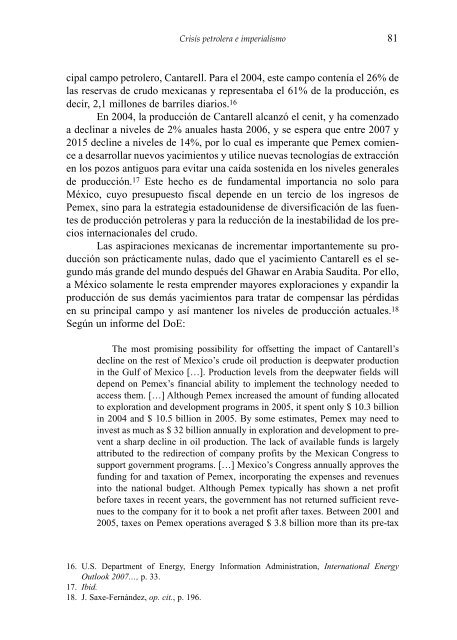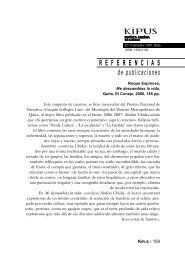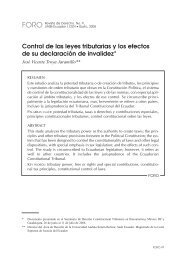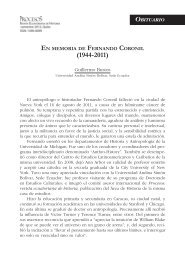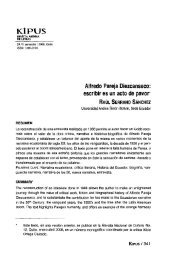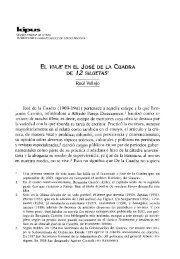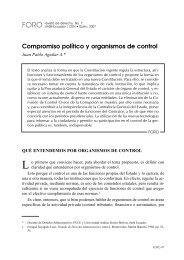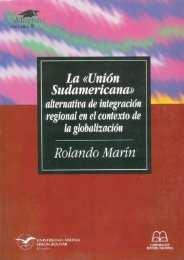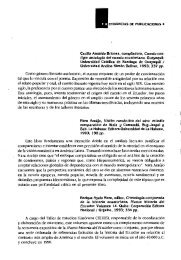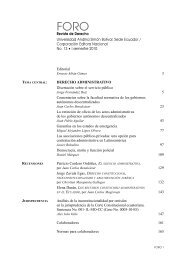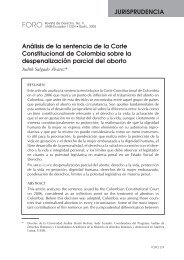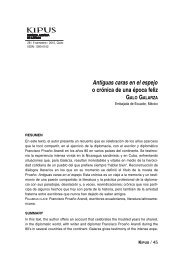Crisis petrolera e imperialismo - Repositorio UASB-Digital
Crisis petrolera e imperialismo - Repositorio UASB-Digital
Crisis petrolera e imperialismo - Repositorio UASB-Digital
You also want an ePaper? Increase the reach of your titles
YUMPU automatically turns print PDFs into web optimized ePapers that Google loves.
<strong>Crisis</strong> <strong>petrolera</strong> e <strong>imperialismo</strong> 81<br />
cipal campo petrolero, Cantarell. Para el 2004, este campo contenía el 26% de<br />
las reservas de crudo mexicanas y representaba el 61% de la producción, es<br />
decir, 2,1 millones de barriles diarios. 16<br />
En 2004, la producción de Cantarell alcanzó el cenit, y ha comenzado<br />
a declinar a niveles de 2% anuales hasta 2006, y se espera que entre 2007 y<br />
2015 decline a niveles de 14%, por lo cual es imperante que Pemex comience<br />
a desarrollar nuevos yacimientos y utilice nuevas tecnologías de extracción<br />
en los pozos antiguos para evitar una caída sostenida en los niveles generales<br />
de producción. 17 Este hecho es de fundamental importancia no solo para<br />
México, cuyo presupuesto fiscal depende en un tercio de los ingresos de<br />
Pemex, sino para la estrategia estadounidense de diversificación de las fuentes<br />
de producción <strong>petrolera</strong>s y para la reducción de la inestabilidad de los precios<br />
internacionales del crudo.<br />
Las aspiraciones mexicanas de incrementar importantemente su producción<br />
son prácticamente nulas, dado que el yacimiento Cantarell es el segundo<br />
más grande del mundo después del Ghawar en Arabia Saudita. Por ello,<br />
a México solamente le resta emprender mayores exploraciones y expandir la<br />
producción de sus demás yacimientos para tratar de compensar las pérdidas<br />
en su principal campo y así mantener los niveles de producción actuales. 18<br />
Según un informe del DoE:<br />
The most promising possibility for offsetting the impact of Cantarell’s<br />
decline on the rest of Mexico’s crude oil production is deepwater production<br />
in the Gulf of Mexico […]. Production levels from the deepwater fields will<br />
depend on Pemex’s financial ability to implement the technology needed to<br />
access them. […] Although Pemex increased the amount of funding allocated<br />
to exploration and development programs in 2005, it spent only $ 10.3 billion<br />
in 2004 and $ 10.5 billion in 2005. By some estimates, Pemex may need to<br />
invest as much as $ 32 billion annually in exploration and development to prevent<br />
a sharp decline in oil production. The lack of available funds is largely<br />
attributed to the redirection of company profits by the Mexican Congress to<br />
support government programs. […] Mexico’s Congress annually approves the<br />
funding for and taxation of Pemex, incorporating the expenses and revenues<br />
into the national budget. Although Pemex typically has shown a net profit<br />
before taxes in recent years, the government has not returned sufficient revenues<br />
to the company for it to book a net profit after taxes. Between 2001 and<br />
2005, taxes on Pemex operations averaged $ 3.8 billion more than its pre-tax<br />
16. U.S. Department of Energy, Energy Information Administration, International Energy<br />
Outlook 2007…, p. 33.<br />
17. Ibid.<br />
18. J. Saxe-Fernández, op. cit., p. 196.


